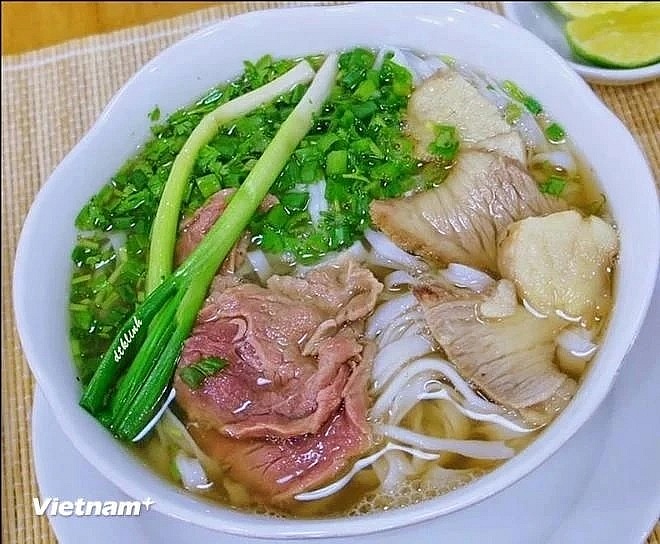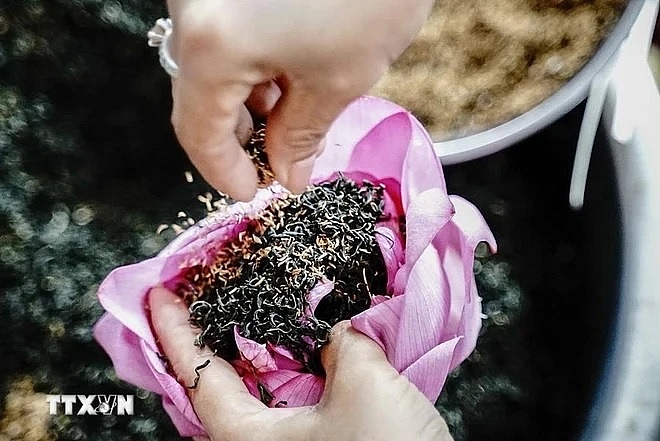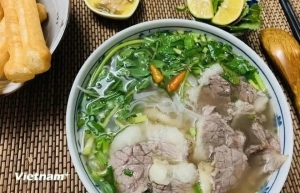Hanoi’s Pho, lotus tea-making recognised as national cultural heritage
 |
| There are various explanations of Pho’s origin. - Illustrative image (Photo: VNA) |
There are various explanations of Pho’s origin. Some say it started as a variation on pot-au-feu, a French beef stew dish, while others believe it’s a heir to a Chinese beef noodle soup or to a traditional Vietnamese dish of noodle with buffalo meat. Whatsoever the origin may be, it is certain that “pho”, a simple yet deceptively complex dish of noodle served with beef or chicken in a hot bowl of broth, has become Vietnam’s pride on the world map of cuisine.
Though its origins are disputable, historians believe “pho” was first made popular in Hanoi, besides the northern province of Nam Dinh, during the French colonial period. It began life on the side of the road, on the shoulders of street vendors who wandered the city with a big pot of both, always kept hot and ready with their mobile stoves. It was reinvented many times by vendors and home cooks with ingredients that were available to even the poorest, and it was shaped by the country’s turbulent history.
By the 20th century, “Pho” became popular as successful street vendors opened their stores in big cities across the country. As if dictated by some rule, most stores are named after their founders in a single word, such as “Pho Hien”, “Pho Thin” or “Pho Co”.
“Pho” with beef has a strong flavour from cow bones, while that with chicken boasts a gentler aroma and may come with fatty or lean chicken. Each has its own merits.
Vietnamese people eat “pho” all the time: for breakfast, lunch, dinner, and supper. It’s variable and always satisfying even though there are only two choices when it comes to the meat: chicken or beef.
“Pho” can be found everywhere and enjoyed anywhere: in a train cruising along the country, on a boat in a bustling floating market of the Mekong Delta and on the pavement of a busy city. It remains a simple and widely affordable dish that carries both the history and identity of the people that create it.
 |
| The craft of making lotus tea in Quang An has a long history, closely associated with the famous West Lake area. (Photo: VNA) |
Meanwhile, the craft of making lotus tea in Quang An has a long history, closely associated with the famous West Lake area.
Since ancient times, locals have skillfully combined Tan Cuong green tea from Thai Nguyen province - the largest tea cultivation area in Vietnam, with Bach Diep lotus grown in West Lake, creating a distinctive and unique flavor that cannot be found elsewhere.
The process of making lotus tea may seem simple, but to have the best taste, it requires meticulousness and sophistication.
Lotus bulbs are picked from early morning until noon when they are at their purest. Brought home, they must be washed thoroughly to prepare the ingredients for making tea.
A well-made pot of tea has a clear green-yellow liquid. Sipping lotus tea provides a soothing and relaxing experience.
The tea is not only a beloved specialty among the tourists but also a symbol of Hanoi's culinary culture.
The honour is seen as a motivation for artisans to continue preserving and promoting the cultural heritage of the thousand-year-old capital. It also presents an opportunity to further promote Hanoi's cultural and tourism values to both domestic and international visitors.
With its distinctive flavor and meticulous preparation, enjoying the lotus-scented tea has become an essential part of the tourism experience in Hanoi.
 | Hanoi eyes boost to West Lake lotus brand's economic potential Tay Ho district in Hanoi should capitalise on the economic opportunities presented by its renowned West Lake lotus brand. |
 | “Pho” of Hanoi, Nam Dinh recognised as national intangible cultural heritage “Pho” (Noodle soup) of Hanoi capital city and the northern province of Nam Dinh has been named in the national intangible cultural heritage list by the Ministry of Culture, Sports and Tourism. |
What the stars mean:
★ Poor ★ ★ Promising ★★★ Good ★★★★ Very good ★★★★★ Exceptional
Related Contents
Latest News
More News
- Dong Ho folk painting added to UNESCO’s urgent safeguarding list (December 11, 2025 | 18:09)
- Conference focuses on switch from dog and cat meat trade to sustainable, safe jobs (December 11, 2025 | 12:13)
- 3F Plus clean pork amazes Michelin-starred chefs (December 09, 2025 | 12:15)
- The Rhythm of Blues – Colours of the Year 2026 (December 06, 2025 | 12:10)
- Pan Pacific Hanoi kicks off 2026 art awards celebrating young and disabled artists (November 06, 2025 | 18:25)
- PREP AI Language Fair 2025 highlights AI-powered language learning (November 03, 2025 | 09:00)
- Hanoi strengthens rabies control and supports transition of dog and cat meat trade (October 28, 2025 | 18:09)
- World-famous Gaia Earth installation touches down at UNIS Hanoi (October 07, 2025 | 13:40)
- Sidecar passion drives Vietnamese motor enthusiasts wild (September 05, 2025 | 09:00)
- Sheraton Saigon unveils artistic mooncake collection for 2025 (August 08, 2025 | 09:00)

 Tag:
Tag:




















 Mobile Version
Mobile Version